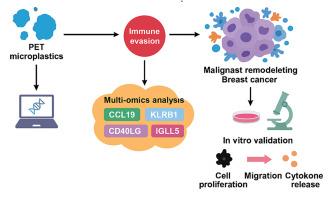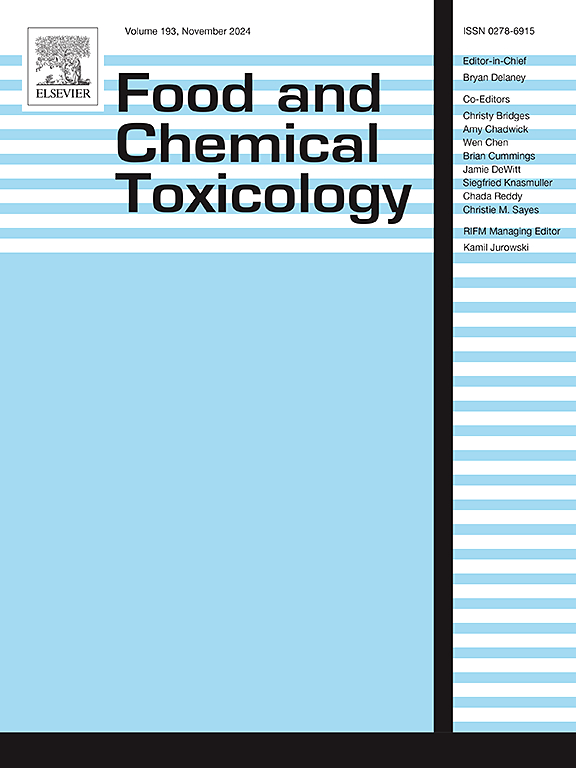聚对苯二甲酸乙二醇酯微塑料通过多组学鉴定的免疫检查点诱导乳腺癌的免疫逃避和恶性重塑
IF 3.5
3区 医学
Q2 FOOD SCIENCE & TECHNOLOGY
引用次数: 0
摘要
聚对苯二甲酸乙二醇酯(PET)微塑料(MPs)已成为一种重要的环境污染物,对人类健康具有潜在的不利影响,特别是在癌症生物学方面。本研究探讨PET-MPs对乳腺癌(BC)进展影响的分子和免疫学机制。采用结合公共癌症数据库(TCGA)生物信息学分析、分子对接模拟和体外实验的综合方法,我们确定了四种免疫相关基因——ccl19、KLRB1、CD40LG和igll5,它们可能被PET-MPs调节。分子对接表明,PET低聚物(2-羟乙基)对苯二甲酸乙二醇酯(BHET)与这些蛋白高亲和力结合,表明PET- mps可能改变肿瘤微环境(TME)内的免疫稳态。此外,PET-MPs诱导促炎细胞因子反应,包括IL-6和TNF-α分泌升高,从而促进肿瘤进展。我们的研究结果进一步表明,PET-MPs可能通过免疫调节增强BC细胞的增殖和存活。然而,局限性包括缺乏免疫细胞共培养模型和体内验证。这项研究为PET-MPs的免疫毒性提供了重要的见解,并强调了进一步研究探索其对癌症发展的直接和间接影响的必要性。本文章由计算机程序翻译,如有差异,请以英文原文为准。

Polyethylene Terephthalate Microplastics Induce Immune Evasion and Malignant Remodeling in Breast Cancer Through Multi-Omics-Identified Immune Checkpoints
Polyethylene terephthalate (PET) microplastics (MPs) have emerged as a significant environmental contaminant with potential adverse effects on human health, particularly in cancer biology. This study investigates the molecular and immunological mechanisms underlying the influence of PET-MPs on breast cancer (BC) progression. Employing an integrative approach that combines bioinformatics analysis of public cancer databases (TCGA), molecular docking simulations, and in vitro experiments, we identified four immune-related genes—CCL19, KLRB1, CD40LG, and IGLL5—that are potentially modulated by PET-MPs. Molecular docking indicated that bis(2-hydroxyethyl) terephthalate (BHET), a key PET oligomer, binds with high affinity to these proteins, suggesting that PET-MPs may alter immune homeostasis within the tumor microenvironment (TME). Additionally, PET-MPs induced a pro-inflammatory cytokine response, including elevated IL-6 and TNF-α secretion, which could promote tumor progression. Our findings further suggest that PET-MPs may enhance BC cell proliferation and survival through immune modulation. However, limitations include the lack of immune cell co-culture models and in vivo validation. This study provides essential insights into the immunotoxicity of PET-MPs and highlights the need for further research to explore their direct and indirect effects on cancer development.
求助全文
通过发布文献求助,成功后即可免费获取论文全文。
去求助
来源期刊

Food and Chemical Toxicology
工程技术-毒理学
CiteScore
10.90
自引率
4.70%
发文量
651
审稿时长
31 days
期刊介绍:
Food and Chemical Toxicology (FCT), an internationally renowned journal, that publishes original research articles and reviews on toxic effects, in animals and humans, of natural or synthetic chemicals occurring in the human environment with particular emphasis on food, drugs, and chemicals, including agricultural and industrial safety, and consumer product safety. Areas such as safety evaluation of novel foods and ingredients, biotechnologically-derived products, and nanomaterials are included in the scope of the journal. FCT also encourages submission of papers on inter-relationships between nutrition and toxicology and on in vitro techniques, particularly those fostering the 3 Rs.
The principal aim of the journal is to publish high impact, scholarly work and to serve as a multidisciplinary forum for research in toxicology. Papers submitted will be judged on the basis of scientific originality and contribution to the field, quality and subject matter. Studies should address at least one of the following:
-Adverse physiological/biochemical, or pathological changes induced by specific defined substances
-New techniques for assessing potential toxicity, including molecular biology
-Mechanisms underlying toxic phenomena
-Toxicological examinations of specific chemicals or consumer products, both those showing adverse effects and those demonstrating safety, that meet current standards of scientific acceptability.
Authors must clearly and briefly identify what novel toxic effect (s) or toxic mechanism (s) of the chemical are being reported and what their significance is in the abstract. Furthermore, sufficient doses should be included in order to provide information on NOAEL/LOAEL values.
 求助内容:
求助内容: 应助结果提醒方式:
应助结果提醒方式:


